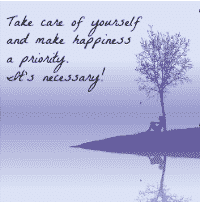Ideas for Coping with Grief
Where to find your support
One of the critical factors in healing from grief is the support of other people. Having support from your family, friends, or a community of others who have also experienced grief allows you to feel that someone else “gets it.” Being able to share your story or your feelings is vital to the healing process.
Places to find grief support
 Faith-based groups: If you are religious, you may find a grief support group in your community or with the leader of your church or temple. They may be able to offer suggestions for rituals or prayers that can be helpful. Because of their role in the community, they may have extensive experience with loss.
Faith-based groups: If you are religious, you may find a grief support group in your community or with the leader of your church or temple. They may be able to offer suggestions for rituals or prayers that can be helpful. Because of their role in the community, they may have extensive experience with loss.
Grief support groups: There are many types of grief support groups for both general and specific types of loss. If this feels intimidating, remember that you can attend a grief support group and listen. You won’t be forced to speak until you’re comfortable, and you may draw comfort from being in a community of others who have some understanding of the depth of your grief. You can find a local grief support group on HealGrief.org.
Therapists or counselors: Sometimes, talking to a professional with experience in grief and counseling can help you work through some of the intense emotions you may be feeling. It’s normal to feel vulnerable during grief, and you might not always want to share your thoughts with the people in your daily life. A compassionate third party with experience in grief support may help you overcome obstacles to your healing. A local professional may also be able to direct you to a grief support group in your local community. You can find more resources here.
Community: Through community, you may feel less isolated. However, if you are a private person who prefers not to be in an environment like a grief support group, or if you don’t have a local network of grief support, you may choose online groups.
Taking care of yourself
In addition to finding support or a grief support group, when you’re grieving, it is both important and difficult to take care of yourself. Your loss may take away your energy, your appetite, and your emotional reserves.
Ways to take care of yourself
 Allow yourself to grieve: Often, we push the grief away or tamp it down by distracting ourselves with activities or tasks. Trying to avoid grief only leads to prolonging it — the grief has to be allowed to surface. Unresolved grief, often referred to as complicated grief, can lead to depression, anxiety, substance abuse, and health problems.
Allow yourself to grieve: Often, we push the grief away or tamp it down by distracting ourselves with activities or tasks. Trying to avoid grief only leads to prolonging it — the grief has to be allowed to surface. Unresolved grief, often referred to as complicated grief, can lead to depression, anxiety, substance abuse, and health problems.
Tangibly express your feelings: This can be done in many ways, depending on your creativity or usual means of expression. You can write about your loss in a journal or send a private note to the person you’ve lost. You can create a scrapbook, photo album, or set up an online memorial to celebrate that person’s life. You can also get involved in an organization or philanthropy that was meaningful to them, or donate in their name.
Be physically healthy: Your mind and body are interconnected, and physical health supports the emotional healing process. It’s natural to feel lethargic or low energy, but if you’re able to take a walk or a run, it will promote the process. Combat your fatigue with an appropriate amount of sleep, and choose foods that provide you not just with comfort but also with energy.

